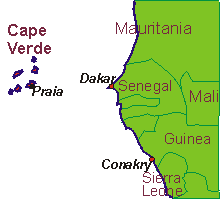|
afrol.com, 22 March - Pedro Pires today, Thursday 22 March, officially took over the presidential powers in the Republic of Cape Verde, succeeding President Antonio Mascarenhas Monteiro. He thereby became the archipelago's third president since independence, after a difficult recount of the disputed poll. Even though Pedro Pires had decided not to mark his inauguration as president by inviting international guests, citing "economic and logistic" reasons, finally some representatives of "friendly states" attended the ceremony. Most important guests were the president of the Angolan parliament, Roberto de Almeida, and the Mozambican Prime Minister, Pascoal Mocumbi. Not confirmed sources from Pedro Pires' governing party PAICV (the African Party for the Independence of Cape Verde) also mentioned that the Ivorian President, Laurent Gbagbo, was expected in the Cape Verdean capital Praia. The presence of the African leaders to the inauguration ceremony in Praia was all on their own initiative, sources in Cape Verde claim. As afrol.com earlier reported, Pedro Pires already on 7 March was declared winner of the Cape Verdean election's second round. Very few votes however separated the two contesters, Pires and Carlos Veiga Movement for Democracy, MPD), and both candidates had reported minor irregularities during their campaigns. A High Court rule on a re-election could therefore not be ruled out, but instead a re-counting was carried out, finally confirmed Pires' narrow win.
Ex-president Antonio Mascarenhas Monteiro, stepping down today, won his office in the first multi-party elections in 1991, being an independent candidate. He also won the 1996 elections. Monteiro steps down as a popular man after having served the two terms the Constitution allows him. Cape Verde has been distinguished by a model democracy since the peaceful conversion to a multi-party system in 1991. This year's election, although becoming a thriller due to the close vote, were generally orderly and confirmed the democratic trends on the archipelago.
|
front page
| news
| countries
| archive
| currencies
| news alerts login
| about afrol News
| contact
| advertise
| español
©
afrol News.
Reproducing or buying afrol News' articles.
You can contact us at mail@afrol.com


 Pires takes on powers in a Cape Verdean nation that has turned into a positive economic development. Annual growth rates of 8 percent in both 1998 and 1999 have been followed by an inflation rate lowering to only 4 percent (1999). Structural reforms under the previous government led to liberalisation, growth and foreign investments. Greater inequity due to the liberalisation however seem to have contributed to the loss of the MPD in a country that has been used to left wing policies. Pires' PAICV party is considered a moderate leftist party, and has been campaigning on this ground.
Pires takes on powers in a Cape Verdean nation that has turned into a positive economic development. Annual growth rates of 8 percent in both 1998 and 1999 have been followed by an inflation rate lowering to only 4 percent (1999). Structural reforms under the previous government led to liberalisation, growth and foreign investments. Greater inequity due to the liberalisation however seem to have contributed to the loss of the MPD in a country that has been used to left wing policies. Pires' PAICV party is considered a moderate leftist party, and has been campaigning on this ground.